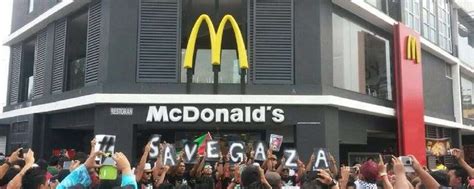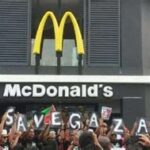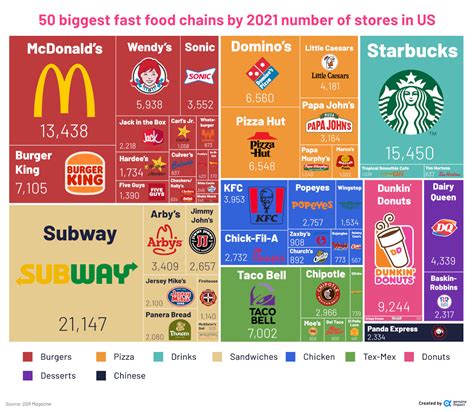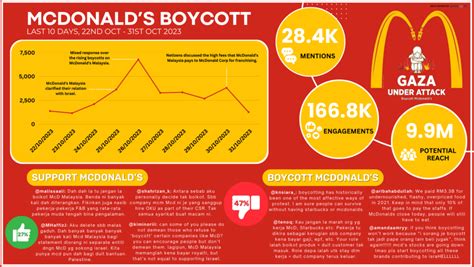
McDonald’s has issued an official response to the ongoing boycott campaigns targeting the fast-food giant, asserting that it remains committed to its existing stance amidst pressure related to the Israeli-Palestinian conflict. The company emphasizes that it does not fund or support any governments involved in the conflict and operates as a local business in each of the countries where it has a presence.
McDonald’s is facing significant pressure from pro-Palestinian activists who are calling for boycotts due to perceived support for Israel. This pressure has led to varying degrees of impact on the company’s operations in different regions, particularly in Muslim-majority countries. The controversy primarily stems from actions taken by local franchisees, which have been interpreted as taking sides in the ongoing conflict. McDonald’s, however, maintains it is neutral.
The official statement underscores the company’s dedication to providing support to the communities in which it operates, regardless of their background. This message aims to counter accusations of bias and reinforce the company’s position as a non-political entity. The situation highlights the increasing challenges multinational corporations face in navigating complex geopolitical issues while maintaining their brand image and business operations.
McDonald’s Addresses Boycott: Stands Firm on Stance
McDonald’s has officially responded to widespread boycott campaigns spurred by perceptions of the fast-food chain taking sides in the Israeli-Palestinian conflict, asserting it remains steadfast in its current position. The company firmly states it does not provide funding or support to any government involved in the conflict and operates as a local brand within each nation where it has a presence. This statement comes as McDonald’s grapples with escalating pressures from pro-Palestinian activists advocating for boycotts in response to actions taken by some of its franchisees, which have been interpreted as showing support for Israel.
The boycott campaigns have notably affected McDonald’s business in several Muslim-majority countries, prompting the corporation to clarify its stance and reaffirm its commitment to neutrality. In a formal statement, McDonald’s emphasized its dedication to the communities it serves, irrespective of their background, aiming to dispel any notion of bias and reinforce its position as a non-political entity.
“We are aware of and saddened by the misinformation and inaccurate reports regarding our position in response to the conflict in the Middle East,” McDonald’s stated. “McDonald’s Corporation is not funding or supporting any governments involved in this conflict, and any actions from our local developmental licensee business partners were made independently without McDonald’s consent or approval.”
The controversy began following actions by specific franchisees in the aftermath of the recent escalation of violence in the region. For instance, McDonald’s Israel reportedly offered free or discounted meals to Israeli soldiers, which triggered outrage among pro-Palestinian supporters. Simultaneously, McDonald’s operators in some Muslim-majority countries publicly announced financial donations to humanitarian efforts in Gaza. These divergent responses created a perception of conflicting loyalties, leading to calls for boycotts against the global brand.
McDonald’s global headquarters has emphasized that these actions were independent decisions made by local operators. According to the company, the developmental licensees, who own and operate McDonald’s restaurants in specific regions, have the autonomy to make business decisions that align with local customs and values. However, these decisions must also adhere to the company’s overall brand standards and ethical guidelines.
The company’s statement reflects the delicate balancing act multinational corporations face as they navigate complex geopolitical issues. McDonald’s finds itself caught between the conflicting demands of its diverse customer base and the potential for reputational damage from being perceived as taking sides in international conflicts. The situation underscores the growing scrutiny corporations face regarding their social and political responsibilities and the challenges of maintaining a consistent global brand image in a highly interconnected world.
The ongoing boycott campaigns have had varying impacts on McDonald’s operations. In some Muslim-majority countries, sales have reportedly declined, and protests have been organized outside McDonald’s restaurants. The company is actively working to mitigate the damage by engaging with local communities and reaffirming its commitment to its core values of inclusivity and neutrality.
The incident also highlights the power of social media in shaping public opinion and driving consumer activism. The boycott campaigns have gained significant traction through online platforms, where activists share information, organize protests, and call for consumers to boycott McDonald’s and other companies perceived as supporting Israel. This demonstrates the increasing importance of corporate social responsibility and the need for companies to be transparent and accountable in their actions.
Beyond the immediate impact on sales and brand reputation, the controversy raises broader questions about the role of corporations in addressing social and political issues. Some argue that companies have a responsibility to take a stand on important issues, while others believe that they should remain neutral and focus on their core business operations. However, in an increasingly interconnected and polarized world, it is becoming increasingly difficult for companies to avoid taking a position on sensitive issues.
McDonald’s decision to reaffirm its existing stance reflects a calculated approach to managing the crisis. By emphasizing its neutrality and commitment to local communities, the company hopes to mitigate the damage from the boycott campaigns and maintain its long-term business interests. However, the situation remains fluid, and it is unclear whether the company’s efforts will be enough to fully restore its reputation in affected regions. The company recognizes the need for continuous evaluation of its strategies and adaptation to the rapidly changing geopolitical landscape.
McDonald’s has reiterated its commitment to upholding its core values, which include respecting diversity, promoting inclusivity, and operating ethically in all of its markets. The company is actively engaging with its franchisees to ensure that they understand and adhere to these values in their local operations. McDonald’s is also working to improve its communication and transparency, providing clear and accurate information about its stance on sensitive issues.
The company’s response to the boycott threat is multifaceted, involving both reactive damage control and proactive measures aimed at preventing similar issues from arising in the future. By underscoring its global decentralization model – where local franchisees operate with considerable autonomy – McDonald’s seeks to distance itself from actions taken by individual licensees. Furthermore, the company has amplified its commitment to local communities, emphasizing contributions made by McDonald’s restaurants to regional economies and charitable causes.
McDonald’s continues to monitor the situation closely and engage with stakeholders to address their concerns. The company is committed to finding a way forward that respects the diverse perspectives of its customers, employees, and communities, while also upholding its core values and business interests. The outcome of this situation will likely serve as a case study for other multinational corporations navigating similar challenges in the future.
McDonald’s is not the only multinational corporation facing boycott calls amid the Israeli-Palestinian conflict. Several other companies have also been targeted for perceived support of either side, highlighting the growing trend of consumer activism and the increasing pressure on corporations to take a stand on social and political issues. This trend underscores the need for companies to be proactive in managing their social and political risks and to be prepared to respond effectively to boycott campaigns and other forms of consumer activism.
In addition to addressing the immediate crisis, McDonald’s is also taking steps to strengthen its corporate social responsibility programs and to improve its engagement with stakeholders. The company is working to identify and address potential social and environmental risks in its supply chain and to promote sustainable practices throughout its operations. McDonald’s is also investing in programs that support local communities, such as education and job training initiatives.
The controversy surrounding McDonald’s response to the Israeli-Palestinian conflict highlights the complex and multifaceted challenges that multinational corporations face in today’s globalized world. Companies must navigate a complex web of social, political, and economic factors while also maintaining their brand reputation and business interests. This requires a sophisticated understanding of global issues, a commitment to ethical business practices, and a willingness to engage with stakeholders to address their concerns.
McDonald’s experience serves as a cautionary tale for other companies operating in politically sensitive regions. It emphasizes the importance of clear communication, consistent messaging, and a proactive approach to managing social and political risks. Companies must also be prepared to adapt their strategies and operations to respond to changing circumstances and to engage with stakeholders in a transparent and accountable manner.
The current situation demonstrates the increasingly interconnected nature of global politics and business. What was initially a localized conflict has had far-reaching consequences for a global brand like McDonald’s. This underscores the need for businesses to be aware of the geopolitical landscape and to understand how their actions can be interpreted and perceived by different communities around the world.
In conclusion, McDonald’s is facing a significant challenge in navigating the complex and sensitive issue of the Israeli-Palestinian conflict. The company’s response, which emphasizes neutrality and commitment to local communities, reflects a calculated effort to mitigate the damage from ongoing boycott campaigns and maintain its long-term business interests. However, the situation remains fluid, and it is unclear whether the company’s efforts will be enough to fully restore its reputation in affected regions. The incident serves as a reminder of the increasing importance of corporate social responsibility and the need for companies to be transparent and accountable in their actions.
The situation’s progression underscores the need for consistent global messaging, particularly for brands operating under a franchise model. McDonald’s challenge resides in maintaining uniform brand values across diverse cultural and political landscapes, where interpretations and consumer sensitivities vary widely. Going forward, the company may need to re-evaluate its communication strategies and franchisee oversight to avoid similar controversies. The incident also emphasizes the increasing power of social media in amplifying localized events into global crises, necessitating robust online reputation management and crisis communication protocols.
Frequently Asked Questions (FAQ)
1. What is the main reason for the boycott against McDonald’s?
The boycott against McDonald’s is primarily driven by perceptions that the company has taken sides in the Israeli-Palestinian conflict. This stems from actions taken by some local franchisees, particularly McDonald’s Israel, which reportedly offered free meals to Israeli soldiers. This was interpreted by pro-Palestinian activists as support for Israel, leading to widespread calls for boycotts. Conversely, some franchisees in Muslim-majority nations made donations to Gaza.
2. What is McDonald’s official response to the boycott?
McDonald’s has issued an official statement asserting that it does not fund or support any governments involved in the Israeli-Palestinian conflict. The company emphasizes that it operates as a local business in each country and that actions taken by local developmental licensee business partners were made independently without McDonald’s consent or approval. McDonald’s also reiterated its commitment to supporting the communities in which it operates, regardless of their background.
3. How has the boycott affected McDonald’s business?
The boycott has reportedly impacted McDonald’s business in several Muslim-majority countries, with reports of declining sales and organized protests outside restaurants. The extent of the impact varies by region, and the company is actively working to mitigate the damage by engaging with local communities and reaffirming its commitment to its core values.
4. Does McDonald’s have a consistent policy on political issues across all its franchises?
McDonald’s operates under a developmental licensee model, where local franchisees have autonomy in making business decisions that align with local customs and values. However, these decisions must adhere to the company’s overall brand standards and ethical guidelines. This decentralized structure can lead to varying responses to political issues across different franchises, as seen in the differing actions of McDonald’s Israel and McDonald’s operators in some Muslim-majority countries. The company insists they do not support any side in the conflict.
5. What steps is McDonald’s taking to address the concerns raised by the boycott?
McDonald’s is taking several steps to address the concerns raised by the boycott. These include:
- Reaffirming its commitment to neutrality in the Israeli-Palestinian conflict.
- Emphasizing its support for local communities, regardless of their background.
- Engaging with stakeholders to address their concerns.
- Strengthening its corporate social responsibility programs.
- Improving its communication and transparency.
- Working with its franchisees to ensure they understand and adhere to the company’s core values.
- Continuous evaluation of its strategies and adaptation to the rapidly changing geopolitical landscape.
Expanded In-Depth Analysis and Context
The situation surrounding McDonald’s and the boycott calls extends beyond mere financial repercussions; it delves into the intricate realm of corporate social responsibility, geopolitical tensions, and the escalating influence of consumer activism in a digitally connected world. McDonald’s, as a global behemoth, serves as a microcosm for the challenges faced by multinational corporations attempting to navigate increasingly polarized social and political landscapes.
The Decentralized Business Model: A Blessing and a Curse
McDonald’s operational structure, built on a developmental licensee model, is intended to foster localized relevance and responsiveness. Each franchisee is granted substantial autonomy to tailor menus, marketing campaigns, and community engagement strategies to suit the specific cultural and socioeconomic nuances of their region. This model typically allows McDonald’s to seamlessly integrate into diverse markets worldwide, fostering goodwill and brand loyalty by actively participating in local economies and cultural events.
However, in times of geopolitical tension, this decentralized structure can quickly become a liability. The actions of one franchisee, regardless of their local context or intentions, can be easily amplified through social media and perceived as an endorsement of a particular political stance by the entire global brand. The case of McDonald’s Israel offering meals to Israeli soldiers, while perhaps intended as a localized act of support, was swiftly interpreted as a political statement, triggering widespread outrage and boycott calls across the Muslim world.
The challenge for McDonald’s lies in balancing the benefits of localized autonomy with the need for consistent global brand messaging and ethical standards. While franchisees should be empowered to respond to local needs and sensitivities, they must also operate within a framework that prevents actions that could be construed as taking sides in international conflicts or violating the company’s core values.
The Power of Social Media and Consumer Activism
The speed and reach of social media have dramatically amplified the impact of consumer activism. Boycott campaigns, once confined to specific regions or communities, can now rapidly gain global momentum through online platforms. Activists use social media to share information, organize protests, and call for consumers to boycott companies perceived as supporting specific political agendas.
The McDonald’s boycott highlights the power of social media to shape public opinion and influence consumer behavior. The hashtag #BoycottMcDonalds gained widespread traction on various social media platforms, amplifying the call for consumers to abstain from patronizing the fast-food chain. This demonstrates the increasing importance of corporate social responsibility and the need for companies to be transparent and accountable in their actions.
Companies must proactively monitor social media channels, engage with stakeholders, and respond swiftly and effectively to address concerns and correct misinformation. They must also be prepared to adapt their strategies and operations to respond to changing circumstances and to engage with stakeholders in a transparent and accountable manner.
Corporate Social Responsibility in a Polarized World
The controversy surrounding McDonald’s underscores the increasing pressure on corporations to take a stand on social and political issues. Consumers, employees, and investors are increasingly demanding that companies align their values with their business practices and use their influence to promote positive social change.
However, taking a stand on political issues can be fraught with risk, particularly in a polarized world. Companies that are perceived as taking sides in controversial debates can face boycotts, protests, and reputational damage. This creates a dilemma for corporations, who must balance the desire to promote their values with the need to protect their business interests.
McDonald’s response to the boycott reflects a calculated effort to navigate this dilemma. By emphasizing its neutrality and commitment to local communities, the company hopes to mitigate the damage from the boycott campaigns and maintain its long-term business interests. However, the situation remains fluid, and it is unclear whether the company’s efforts will be enough to fully restore its reputation in affected regions.
The Long-Term Implications
The McDonald’s boycott has broader implications for multinational corporations operating in politically sensitive regions. It highlights the need for companies to:
- Develop a sophisticated understanding of global issues and the geopolitical landscape.
- Establish clear and consistent ethical guidelines for their operations.
- Implement robust risk management protocols to identify and mitigate potential social and political risks.
- Engage proactively with stakeholders to address their concerns.
- Communicate transparently about their values and business practices.
- Be prepared to adapt their strategies and operations to respond to changing circumstances.
- Invest in corporate social responsibility programs that promote positive social change.
The McDonald’s case serves as a valuable lesson for other multinational corporations seeking to navigate the complex and challenging landscape of global business. The company’s response, while not without its critics, demonstrates the importance of clear communication, consistent messaging, and a proactive approach to managing social and political risks.
The Role of Franchises in Global Brand Management
McDonald’s isn’t alone in dealing with franchise-related challenges in the context of global political tensions. Many international brands operating under a franchise model face similar dilemmas. The delicate balance between maintaining global brand consistency and allowing local franchisees to adapt to regional sensitivities is constantly tested, especially when political or social issues are involved.
Effective brand management in a franchise system requires clear guidelines and communication protocols. Franchise agreements should outline the expectations regarding brand values, ethical standards, and communication strategies. Regular training and support should be provided to franchisees to ensure they understand these expectations and can effectively navigate sensitive issues.
Franchisors also need to have robust monitoring mechanisms in place to identify potential problems and respond quickly to address them. This includes monitoring social media, tracking customer feedback, and conducting regular audits of franchisee operations.
Looking Ahead: Navigating the Future of Global Business
The McDonald’s experience serves as a case study in the challenges and opportunities facing multinational corporations in an increasingly interconnected and polarized world. The company’s response highlights the importance of corporate social responsibility, transparency, and stakeholder engagement.
As consumer activism continues to grow in influence, companies must be prepared to adapt their strategies and operations to respond to changing expectations. This includes:
- Investing in sustainable business practices.
- Promoting diversity and inclusion in the workplace.
- Supporting local communities.
- Advocating for responsible policies.
By embracing these principles, companies can build stronger relationships with their customers, employees, and communities, and create long-term value for their stakeholders.
The situation with McDonald’s and the boycott is a microcosm of the larger forces shaping global business today. It underscores the imperative for companies to be not only profitable but also responsible, ethical, and attuned to the social and political contexts in which they operate. The future of global business will be defined by companies that can successfully navigate these challenges and create value for all stakeholders.



![[Restaurant Name] Returns! Iconic Chain Revives After 30-Year Absence](https://generasitekno.com/wp-content/uploads/2025/06/unnamed-file-924-150x150.jpg)





